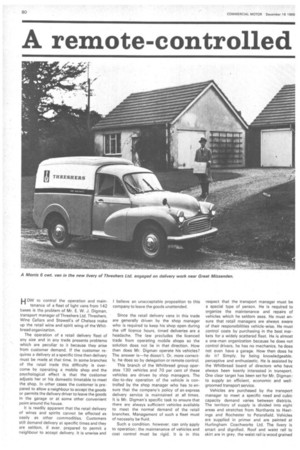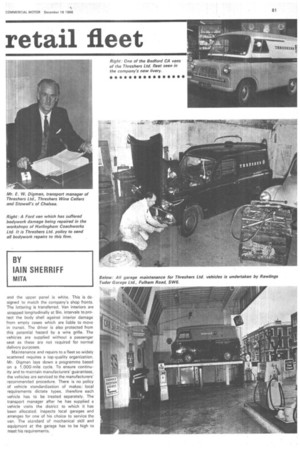A remote-controlled retail fleet
Page 82

Page 83

Page 84

If you've noticed an error in this article please click here to report it so we can fix it.
BY IAIN SHERRIFF
M ITA
14 OW to control the operation and main" tenance of a fleet of light vans from 142 bases is the problem of Mr. E. W. J. Digman, transport manager of Threshers Ltd. Threshers, Wine Cellars and Stowell's of Chelsea make up the retail wine and spirit wing of the Whitbread organization.
The operation of a retail delivery fleet of any size and in any trade presents problems which are peculiar to it because they arise from customer demand. If the customer requires a delivery at a specific time then delivery must be made at that time. In some branches of the retail trade this difficulty is overcome by operating a mobile shop and the psychological effect is that the customer adjusts her or his domestic timetable to meet the shop. In other cases the customer is prepared to allow a neighbour to accept the goods or permits the delivery driver to leave the goods in the garage or at some other convenient point around the house.
It is readily apparent that the retail delivery of wines and spirits cannot be effected as easily as other commodities. Customers still demand delivery at specific times and they are seldom, if ever, prepared to permit a neighbour to accept delivery. It is unwise and I believe an unacceptable proposition to this company to leave the goods unattended.
Since the retail delivery vans in this trade are generally driven by the shop manager who is required to keep his shop open during the off licence hours, timed deliveries are a headache. The law precludes the licenced trade from operating mobile shops so the solution does not lie in that direction. How then does Mr. Digman operate his vehicles? The answer is—he doesn't. Or, more correctly, he does so by delegation or remote control.
This branch of the Whitbread group operates 130 vehicles and 70 per cent of these vehicles are driven by shop managers. The day-to-day operation of the vehicle is controlled by the shop manager who has to ensure that the company's policy of an express delivery service is maintained at all times. It is Mr. Digman's specific task to ensure that there are always sufficient vehicles available to meet the normal demand of the retail branches. Management of such a fleet must of necessity be fluid.
Such a condition, however, can only apply to operation: the maintenance of vehicles and cost control must be rigid. It is in this respect that the transport manager must be a special type of person. He is required to organize the maintenance and repairs of vehicles which he seldom sees. He must ensure that retail managers are always aware of their responsibilities vehicle-wise. He must control costs by purchasing in the best markets for a widely scattered fleet. He is almost a one-man organization because he does not control drivers, he has no mechanics, he does not even have a garage. How then does he do it? Simply, by being knowledgeable, perceptive and enthusiastic. He is assisted by the Whitbread board of directors who have always been keenly interested in transport. One clear target has been set for Mr. Digman: to supply an efficient, economic and wellgroomed transport service.
Vehicles are purchased by the transport manager to meet a specific need and cubic capacity demand varies between districts. The territory of supply is divided into eight areas and stretches from Northants to Hastings and Rochester to Petersfield. Vehicles are supplied in primer and are painted at Hurlingham Coachworks Ltd. The livery is smart and dignified. Roof and waist rail to skirt are in grey, the waist rail is wood grained and the upper panel is white. This is designed to match the company's shop fronts. The lettering is transferred. Van interiors are strapped longitudinally at 9in, intervals to protect the body shell against interior damage from empty cases which are liable to move in transit. The driver is also protected from this potential hazard by a wire grille. The vehicles are supplied without a passenger seat as these are not required for normal delivery purposes.
Maintenance and repairs to a fleet so widely scattered requires a top-quality organization. Mr. Digman lays down a programme based on a 1,000-mile cycle. To ensure continuity and to maintain manufacturers' guarantees. the vehicles are serviced to the manufacturers' recommended procedure. There is no policy of vehicle standardization of makes; local requirements dictate types, therefore each vehicle has to be treated separately. The transport manager after he has supplied a vehicle visits the district to which it has been allocated, inspects local garages and arranges for one of his choice to service the van. The standard of mechanical skill and equipment at the garage has to be high to meet his requirements. Special attention is paid to steering, brakes and clutch and shop managers are constantly reminded that these defects must be reported immediately. Each month defects of a minor nature are reported to the transport manager, who arranges for the repairs after he has decided the priority and arranged a relief vehicle.
There is in remote-control operation and maintenance a great deal of stress placed on mileage. Mileages normally dictate the replacement of tyres. batteries, plugs, and points, and of course engine units, and where vehicles are on the spot they can also be examined. In the case of a remote-controlled fleet the importance of accurate records cannot be over emphasized. In many cases they are the sole basis for the transport manager's decision to replace units. Replacement units are not fitted before the laid-down mileage, without the authority of Mr. Digman. If there is any doubt at all the transport manager goes to the district to inspect the vehicle. This is done so that it does not interfere with the delivery service. Tyres are supplied and fitted by a national tyre distributor who is instructed by Mr. Digman which vehicles should require attention, but a great deal depends on the distributor's periodic examination and report.
What of driving standards? Here the problem of the transport manager is the same as so many of his C-licence counterparts. The drivers are, in the main, shop managers engaged for their ability to run a retail wine and spirit store. While the standard is fairly high it is borne in mind that driving is only a secondary function. In addition, door-to-door delivery means that vehicles encounter all kinds of traffic conditions, and consequently they are subjected to a great deal of wear, compared with vehicles on other types of work.
Accident reports
The figure of one accident for 10.500 road miles given by Mr. Digman is certainly higher than I would have wished for. He explained however that an accident means a vehicle damaged whether or not the company's driver was blameworthy, and he told me that a vast number of vehicles were damaged while parked. In each vehicle there is provided a modified accident report which must be completed at the time of the accident, and this reduces greatly risk of ambiguity in the full statement on the accident which is compiled later. If drivers are in an accident involving an unattended car they are instructed to leave a note of apology and state the company name. etc., thus the other party is given sufficient details to follow up with a claim if desired.
Where possible, fuel and spares are purchased locally and at retail rates. It is of course not feasible to install a fuel pump at all the shops. Bunkering cards could be used, but the company take the view that reciprocal trading is worth a great deal. There is of course a vehicle replacement policy and these are purchased as keenly as possible every five years.
Firm control
In these days of keen competition, many retail delivery fleets are being disbanded. In the wine and spirit trade there is a feeling that the overhead of a delivery fleet is a burden too heavy to bear. This does not apply at Whitbreads: the combined fleets of Stowell's. Threshers, and Wine Cellars will continue to operate, remotely but firmly controlled, by a transport manager without a staff, and who has reduced his fleet recently by 15 per cent without interfering with the company's policy of customer delivery demand being met, The company has not declared anyone to be redundant as a result of this reduced fleet strength.
One gets the impression of an old world courtesy and charm in the way this fleet operates. It is perhaps an impression left by the memory of the Whitbread drays. (The company still supplies horses for the Lord Mayor and the Speaker's coach.) Old world perhaps it is, but certainly not inefficient.




























































































































